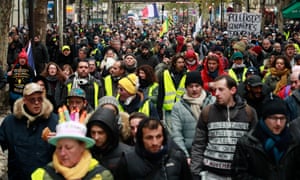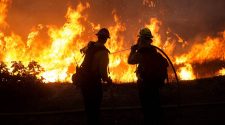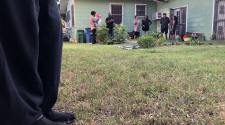The gilets jaunes (yellow vests) movement marked a year of weekend demonstrations with protests across France. In Paris, groups of black-clad youths caused damages at a central square, smashing bus shelters, a bank and torching vehicles.
Police responded by firing teargas and using water cannon against the protesters, only a few of whom were wearing the yellow vests affiliated with the movement. French media blamed “ultra radical” black bloc protesters for the violence.
As clouds of black smoke mingled with the teargas in Place d’Italie, the fire services struggled to put out numerous blazes. Protesters threw missiles at police and gendarmes who withdrew to surrounding streets to stop the clashes spreading.
The 53rd weekend of protests began with gilets jaunes invading the busy Paris ring road, the périphérique, blocking traffic in both directions. They were dispersed by police without violence.
Later, groups, of mainly youths, masked and dressed in black, gathered around Place d’italie, one of the main squares in the French capital.
Demonstrations were planned in other cities including Bordeaux, Lille, Lyon, Marseille, Nantes, Toulouse, Calais, Colmar and Dunkirk.
Paris police cancelled the official gilets jaunes march that was due to set off from Place d’Italie at 2pm. But protesters tore up metal barriers set up around public works at the square and used them to build barricades against riot police.
Sociologist Jean Viard told BFMTV that the “real” gilets jaunes with genuine concerns – many of them women – were on the rural roundabouts and not at Place d’Italie.
The yellow vest movement – named after the fluorescent sleeveless vests French drivers are obliged to carry in their vehicles – began in the autumn of 2018 in opposition to Emmanuel Macron’s decision to hike taxes on vehicle fuel. Protesters claimed this would hit those living in rural areas who depend on vehicles to work.
The movement quickly morphed into a more general opposition to the government, seen as pro-business and out of touch, or indifferent to the daily worries of those outside urban areas.
The government dropped the fuel tax, but gilets jaunes leaders expanded their demands to include citizens referenda on political issues and the return of France’s “wealth tax”, among others.
Attempts by what has been a leaderless movement to set up a gilets jaunes political party ended in acrimony as outspoken members insisted it should remain non-political.
At the height of the protests a year ago, the turn out was estimated at around 282,000 and sparked running battles with French police. Among the most high-profile events was when gilets jaunes invaded the Champs-Élysées, destroying news kiosks, ripping up pavements to throw stones at police and using scaffolding to build barricades across the boulevard. Protesters also sprayed graffiti on the Arc de Triomphe.
On Saturday, the Champs-Élysées was ringed by police, gendarmes and armoured vehicles, in anticipation of protesters.

In Montpellier in the south on the other hand, gilets jaunes gathered in an atmosphere of calm early on Saturday afternoon.
French police and gendarmes have been accused of responding with unjustified violence against protests. Officials have reported that the use of large rubber bullets and crowd dispersion grenades against demonstrators has caused so far around 2,500 injuries including 24 who have lost eyes and five a hand. The police and gendarmes forces say 1,800 of their members have been injured too. Le Monde claimed there had been 10,000 arrests across France during the last year of protests.
The country is still divided over the movement, which is now the longest-running series of protests in French history. Macron has said the protests showed the need for him to put more humanity into what he called his “impatient” style of leadership. He is currently facing other social conflicts, including striking hospital staff and student demonstrations. Unions are also planning a nationwide strike against planned pension reforms, expected to severely disrupt roads and transport.
Over the past few months, the gilets jaunes movement appeared to have run out of steam, though the grievances behind it remain. In June 200 the movement’s delegations gathered to debate its future and how to have a “long-term presence”. Many called for the gilets jaunes to redirect its energies towards hitting the economy, motorway toll booths and oil refineries.
An opinion poll in Le Figaro suggested 68% of the French support the underlying concerns highlighted by the movement. A second poll by BFMTV suggested almost as many – 63% – do not think it should continue its action.















